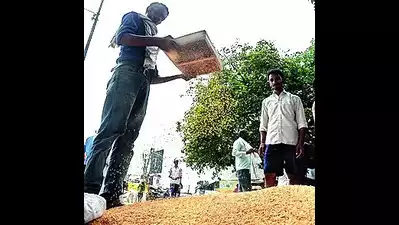Over the last seven years, the Yogi government has prioritised farmers
Lucknow: The Yogi Adityanath cabinet’s first action after the BJP swept to power in Uttar Pradesh in 2017 was to forgive the debts of Rs 36,000 crore owed by almost 86 lakh small and marginal farmers. The electricity bills of more than 1.5 crore farmers who run tubewells were also waived a few days before the election date announcement.

One of the main points of the BJP election platform was the state government’s explicit stance in support of farmers’ interests, which was highlighted by these choices.
Over the last seven years, the Yogi government has prioritised farmers.
After keeping its main election pledge, the state government has said that it will now concentrate on creating jobs and tripling farmer income while using novel strategies, including growing irrigation projects and promoting new crops.
When Chief Minister Yogi said two years ago that his government was going to establish a centre of excellence and high-tech nurseries in Uttar Pradesh, this acquired new momentum. The action was seen as a significant step towards giving agriculture priority.
According to analysts, it also signified a much-needed boost for the horticulture and food processing industries, which are two of the main engines of the state’s economy.
While centres of excellence have been established in Chandauli, Lucknow, Saharanpur, and Kushinagar, high-tech nurseries have been opened in areas like Bahraich, Mau, Rampur, and Aligarh.
The state government made sure that the majority of farmers benefited from the minimum support price even as the Centre adopted the Swaminathan Commission recommendation to allow farmers to earn a fair price for their goods.
According to an official, “the state government has been trying to buy as much wheat and paddy as possible while guaranteeing payment to the farmer within 72 hours.”
According to experts in the agriculture department, ongoing studies in the area of agriculture indicate a persistent decline in the state’s soil health. The balanced application of fertiliser after soil testing from farmer fields at the district/tehsil level provided a long-term solution to this issue.
Under the National Mission for Sustainable Agriculture programme, soil testing is done via the Soil Health Card Scheme.
The state administration has also accelerated the Rashtriya Krishi Vikas Yojna (RKVY), an Indian government flagship programme that aims to close the gap between agricultural production capability and actual crop yield, therefore doubling farmers’ incomes.
This scheme’s primary goals are to boost wheat and paddy yield, enhance soil health, build irrigation infrastructure, make better use of water, and implement agricultural mechanisation.
According to a recent letter from the agricultural department, the National Food Security Mission was also given the attention it deserves in order to guarantee the rise in food grain production via increases in crop area, soil fertility, and farm productivity, as well as continuous productivity growth.
Twenty districts for cereals, 31 for wheat, 75 for pulses, and 23 for paddy are included in the programme. Similar to this, the National Mission on Oilseeds and Oil Palm has been vigorously implemented to boost pulse yield and ongoing efforts to ensure the state’s food grain self-sufficiency. Every district in the state has adopted this plan.







